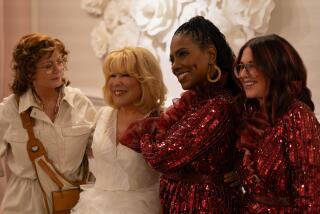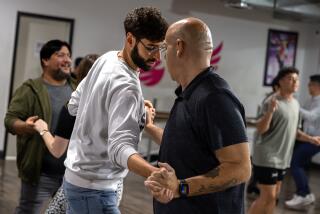Lewitzky’s Feminist Statement
Bella Lewitzky has never made easy choices. So her final creation for her 30-year-old modern dance ensemble (scheduled to be disbanded in mid-1997) predictably avoids any taint of elegiac nostalgia and concentrates on the unfinished business of feminism, one of the defining themes of her career long before the company existed.
Introduced at Occidental College over the weekend, “Four Women in Time” is a bold and sometimes thorny celebration of female power and achievement, with full awareness of what can happen to women who assert themselves in our culture.
Drawing her mythic and historical subjects from Judy Chicago’s controversial “Dinner Party” installation, Lewitzky shows an animating, progenitive Primordial Goddess (Lori McWilliams) becoming destroyed and replaced by a male figure in black. Similar figures crush the charismatic Roman teacher Hypatia (Karen Woo), while the author Virginia Woolf (Heather Harrington) can’t survive the violent emotions buffeting her.
Only the idealized cult-symbol Sophia (Yolande Yorke-Edgell) manages to endure, floating serenely above her followers as if she were pure, disembodied thought. Moreover, Sophia inspires a sustained lyricism from both Lewitzky and composer Larry Attaway that proves the highlight of the piece. (The double-circle formation around her at the end produced an audible sigh from the Saturday audience.)
Elsewhere, Lewitzky emphasizes woman-as-teacher, with both the Primordial Goddess and Hypatia leading group sessions resembling choreography workshops. Mere nurturing isn’t the subject here so much as the passing on of a specific language and way of working. A creative inheritance. You feel very close to Lewitzky as dancer, choreographer and master teacher in such moments, and it’s a pity that the closeness becomes lost in the overextended Woolf mad scene that ends the piece so despairingly.
Strongly danced by everyone, “Four Women in Time” gains from astute programming: Male arrogance looms prominently in both “Inscape” (1976) and “Episode #4 (Turf)” (1993), giving the evening a thematic unity--plus opportunities for the Lewitzky men to shine on their own.
Indeed, “Turf” may have received the hottest ovation on Saturday, a tribute to its forceful portrait of human greed as embodied by Walter Kennedy, Kevin Kimple, Michael Mizerany and John Pennington. Perched on wooden boxes like living gargoyles, they succumb to savagery as if no other possibility exists.
More whimsical in its social satire, “Inscape” ultimately becomes a showcase for the design caprices of the late Rudi Gernreich and the movement possibilities they generate: costumes that leave dancers attached to one another at the hip, masks worn on the back of the head, sleeves and skirts stretching out far beyond the body of the wearer.
Complementing the playfully surreal visual style, Attaway’s score incorporates comically distorted song-samples and plenty of environmental noise. He also contributes the music for “Turf,” artfully gilding the stylized brutality on view.
Fully half the Lewitzky company is new this “farewell season,” so it’s a tribute to Lewitzky-as-teacher and to rehearsal director Walter Kennedy that newcomers such as Kimple and Mizerany fit as well into “Turf” as the veterans in the cast. However, McWilliams remains first among equals in “Four Women,” an artist with enough authority to dominate and energize the corps, plus enough imagination to find the goddess within her and make us believe in her divinity.
* The Lewitzky company performs a different program Sept. 28 at 8 p.m. in the New Theatre at Cal State Northridge, 18111 Nordhoff St. Tickets: $25 and $12 (students and senior citizens). (213) 580-6338.
More to Read
The biggest entertainment stories
Get our big stories about Hollywood, film, television, music, arts, culture and more right in your inbox as soon as they publish.
You may occasionally receive promotional content from the Los Angeles Times.










